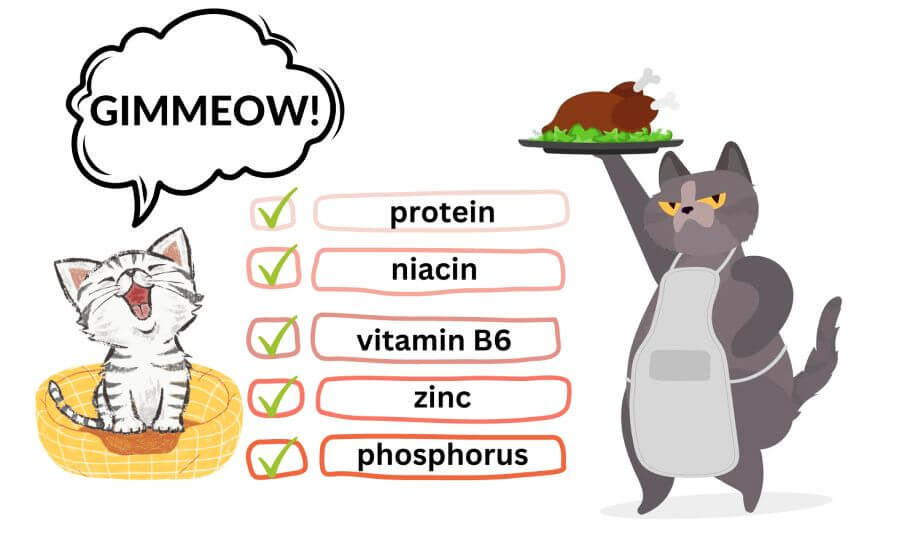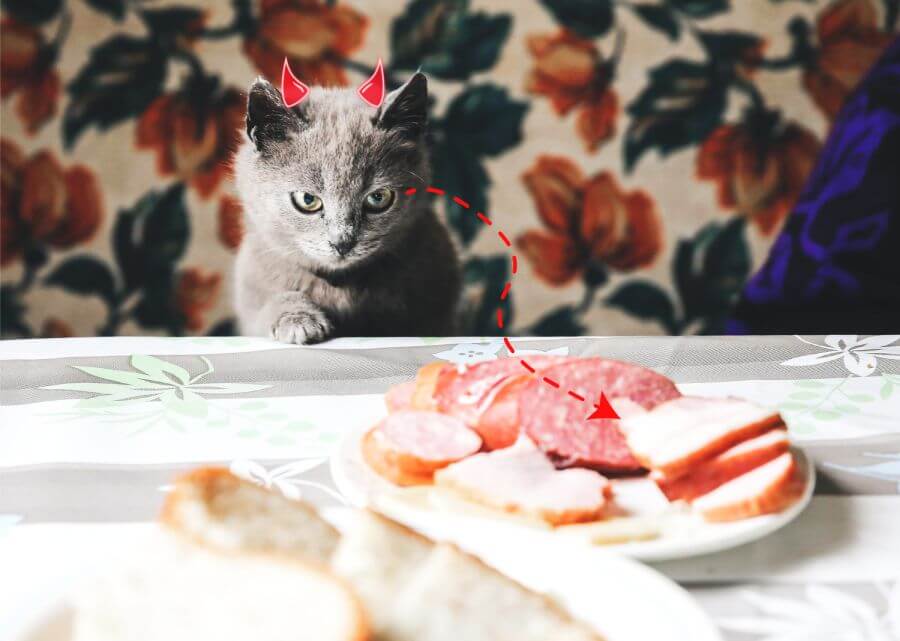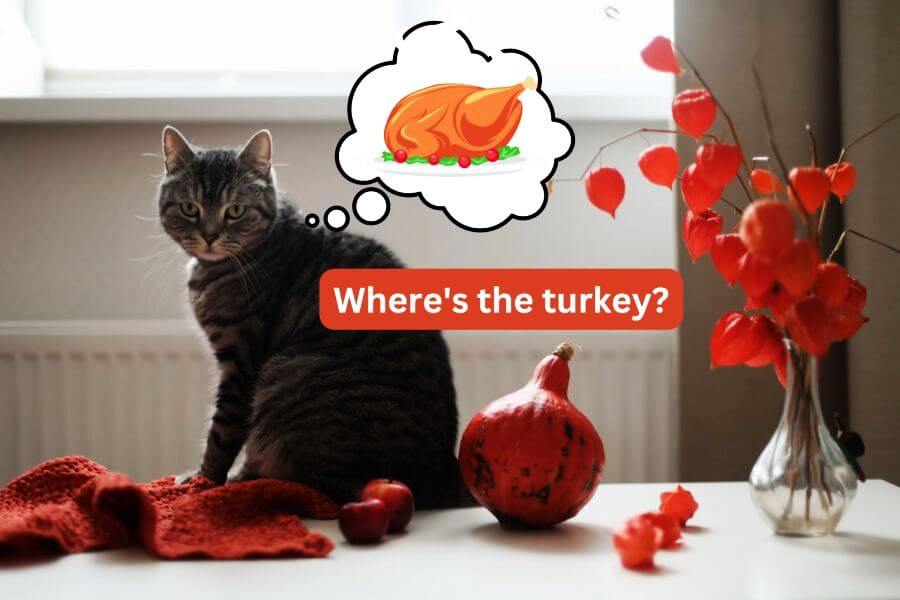Turkey: the bird that’s the star of Thanksgiving and our sandwiches! We love it, but the pressing question is, can cats eat turkey? Is deli turkey the same as your roast dinner when it comes to your feline friend? Buckle up, cat whisperers, it’s time to talk turkey!
💡 Key Purr-spectives 💡
- Cats may be fond of napping, but they need protein-packed treats like turkey to fuel those dream-filled snoozes! 😸
- Turkey serves up a bowlful of health benefits, from hydration to essential nutrients like protein, vitamins, and minerals. 😸
- Cat can eat some turkey in small amounts (think, baby portions). 😸
- But beware of those turkey dishes dripping with spices and additives. They could be the Grinch to your cat’s turkey Christmas! 🙀
- Also, raw meat or undercooked turkey can make your cat unwell. So, the golden rule is: always feed cats cooked turkey. 🙀
Why Is Turkey Good for Cats?🍗
In the world of obligate carnivores, our feline friends sit on the throne. Turkey seems like an ideal offering for our protein-craving rulers. Packed with protein, vitamins, and minerals, turkey can contribute to a cat’s diet like catnip to their fun!
Can cats eat turkey, though? Well, while the thought of adding turkey to their diet is tantalizing, let’s not forget some important tidbits before we toss our kitties some turkey.

Can Cats Eat Cooked Turkey?🍽️
Cooked turkey might be our comfort food, but can cats eat cooked turkey? Absolutely! In fact, this lean bird might help your kitty maintain their model figure. But remember, folks, keep a hawk-eye on the cooking process and ensure that the turkey is thoroughly cooked.
Here’s the catch, though: can cats eat turkey dishes prepared for humans? Not so fast! Seasonings like onions, garlic, and salt can be the super villains for your feline superhero. (The same goes for gravy). So, if you’re roasting that bird for you and your furry mate, exclude these no-no ingredients.
⚠️ Warning: Not All Turkeys Are Equal! ⚠️
Some turkeys come with an invisible cloak of additives and spices that could spell doom for your feline buddy. So, while you’re shopping for that turkey, don’t forget to scan the ingredients label. Your fur baby’s health will thank you!
Is Raw Turkey Safe for Cats?🥩
We might love our steaks rare, but when it comes to our furry friends, can cats eat turkey raw? It’s a resounding NO, folks! Raw turkey can invite unwanted guests like bacteria to your cat’s health party. The risk of salmonella contamination can turn a kitty feast into a fiasco. While the taste might appeal to your cat, the potential diarrhea and vomiting? Definitely not.
We also have to mention the spoiled meat debate. Cats are not our trash cans! If you wouldn’t give it to a baby, don’t give it to a cat baby!
What About Deli Turkey? Yay or Nay?🥪
Your tiny fella might eye that turkey breast deli meat on your sandwich. Can you give your cat a little bite? Sure, you can! Too much of any human food can result in a kitty with a grumpy tummy. Just make sure it’s fresh, and not too salty.

Can Cats Eat Turkey Bones or Skin?🦴
For dogs and cats alike, bones seem like the ultimate trio. But when it comes to turkey, can cats eat turkey bones? Or even the skin? Keep those cooked bones away from your furball, they can splinter and pose a choking hazard.
Can cats eat turkey skin? A tiny nibble now and then is okay, but remember, moderation is key! Turkey skin can be fatty and could contribute to your feline friend becoming a, well, fat cat. For an overweight cat, turkey skin is a definite no-go. Stick to the lean breast meat—it’s a superstar in the cat food world.
How Much Turkey Is Too Much for a Kitty? 🍖
Feeding your cat turkey is like doing the cha-cha, it’s all about balance! How much is okay? A piece no larger than their cute little head, once or twice a week, should do the trick. Turkey’s a great source of protein and a nice addition to your cat’s meals. But don’t forget, they need variety in their protein sources. A protein-deficient diet can lead to an unhappy kitty with health issues. So, go ahead, share those Thanksgiving turkey leftovers, but make sure it’s a side act, not the main event in their food bowl. And remember, no seasoning!

Wrapping Up: Can Cats Eat Turkey? 🏁
Alright, folks, here’s the verdict! Can cats eat turkey? They sure can! Boneless turkey, especially the white meat, is a fine dining choice for your feline friend. It’s a nutritious, low-fat food that’s also easy on their digestion. So, for cats prone to tummy troubles or allergies, turkey could be a good fit. Just remember to take your kitty’s dietary needs into account and stick to unseasoned turkey. 🐱🍗
Frequently Asked Questions 🦃
What Happens If a Cat Eats Turkey?
Well, they may not turn into a turkey, but their digestive system might protest! Also, an all-turkey diet could lead to weight gain if not balanced with other proteins.
Is Turkey or Chicken Better for Cats?
Chicken, the leaner bird, is a great option for overweight cats. On the flip side, turkey, with its higher fat content, suits underweight or cats with digestive issues.
What’s the healthiest meat for cats?
Beef, chicken, and turkey all take the crown here. They’re great sources of animal protein. And don’t forget fish, an excellent source of omega-3 fatty acids.
Similar Posts:
- Can Dogs Eat Turkey? Is It Good for Dogs?
- Can Cats Eat Chicken? Is It Always Safe For Cats?
- Can Cats Eat Bacon? Is Raw Bacon Safe For Cats To Eat?
- Can Cats Eat Raw Chicken? How Good Is Raw Meat?
- Can Cats Eat Corn or Corn Chips?
- Can Cats Eat Pork? Or Is It Bad for Cats?
- Can Cats Eat Ham? The Risks of Feeding a Cat Ham
- Can Cats Eat Shrimp? Is Seafood Safe For Cats?

